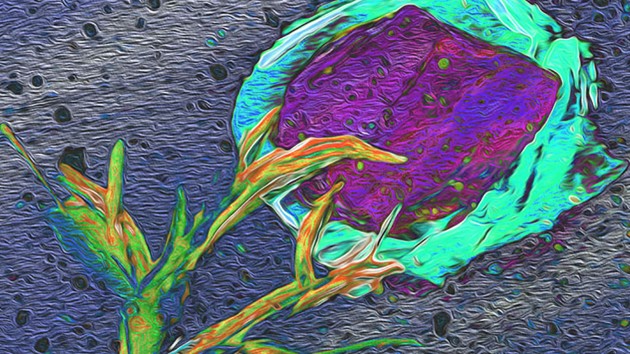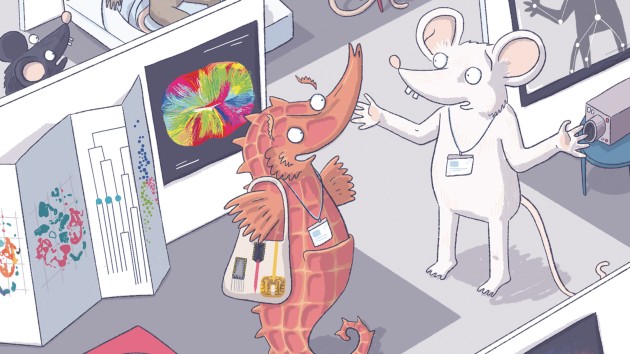Focus |
Collections
Filters
-
Collection Type
-
-
Focus |
 Focus on Learning and Memory
Focus on Learning and Memory
Learning new information and skills, storing memories of this knowledge, and retrieving, modifying, or forgetting these memories over time are critical for flexibly responding to a changing environment.
Image: Jennie Vallis -
-
Focus |
 Focus on Spatial Cognition
Focus on Spatial Cognition
-
Focus |
 Focus on human brain mapping
Focus on human brain mapping
For several decades, the neuroscience community has endeavored to understand how the brain controls our perception of the world and how we interact with it. The molecular, cellular and circuit-level mechanisms that underlie these processes have been investigated primarily in animal models. Noninvasive methods such as magnetic resonance imaging (MRI), electroencephalography (EEG) and magnetoencephalography (MEG) have allowed neuroscientists to complement these findings with measures of human brain responses to complex stimuli and behaviors. Nature Neuroscience presents a special issue highlighting considerations and recent developments in noninvasive techniques that improve our understanding of neural measurements in humans, bridging the gap between human and animal research in neuroscience.
Image: Credit: Getty Images/iStockphoto / Thinkstock \ Robert Adrian Hillman -
Focus |
 Focus on neuroimmune communication
Focus on neuroimmune communication
The nervous and immune systems communicate and reciprocally influence their functional responses. Nature ImmunologyandNature Neurosciencepresent a joint focus entailing a series of specially commissioned review articles that discuss how the nervous system and immune cells interact during development, homeostasis and in pathogenic disease states.
-
Focus |
 Psychiatric Disorders
Psychiatric Disorders
Compared to other areas in medicine, psychiatric research faces unique biological, technological, clinical, regulatory and ethical challenges. In this joint focus Nature Neuroscience and Nature Medicine provide a collection of Commentaries, Perspectives, and Reviews from leaders in the field that address these challenges and provide an authoritative overview of basic and clinical sciences advancing mental health research.
-
Focus |
 Focus on the neuroscience toolbox
Focus on the neuroscience toolbox
There is an accelerating push towards greater selectivity, sensitivity and power in data collection in neuroscience. This is accompanied by the associated development of sophisticated analyses. Nature Neuroscience is pleased to present a special issue focused on techniques that sit at the forefront of modern neuroscience that present a view of recent advances in technical development, a consideration about how these are best deployed, and large-scale initiatives designed to advance further tool development, with expected parallel advances in neurobiological insight.
-
Focus |
 Focus on neural computation and theory
Focus on neural computation and theory
Deep understanding in neuroscience comes from the complementary embrace of theory and experiment. This has been the case in the past, and is only going to become truer in the future. The ability to perform increasingly large parallel measurements of neural activity has been one of the more exciting developments in experimental neuroscience. However, the increased data collection necessitates progressively sophisticated computational techniques and theoretical frameworks to inform our understanding. Nature Neuroscience is pleased to present a special issue focused on recent advances in computational and theoretical neuroscience that highlight the current thinking and unanswered questions on topics that include neural networks and coding, memory formation, sensory perception and decision-making, and psychiatric illness.
-
Focus |
Focus on stress
Stress serves an important purpose in maintaining health, but prolonged or severe stress can be harmful, particularly to the central nervous system. Nature Neurosciencepresents a special issue focused on how stress affects brain function, behavior, and the development of psychiatric diseases, via a series of reviews and perspectives written by leaders in the field.
-
Focus |
ChR2 Anniversary
Ten years ago, channelrhodopsin-2 was expressed in neurons and shown to control their activity. In this issue, we consider how the field has developed since these early optogenetic experiments.
-
Focus |
Epilepsy
Nature Neurosciencepresents a special focus issue on the topic of Epilepsy which, through a series of reviews and opinionated articles from key leaders in the field, aims to highlight many of the most recent and informative research which has expanded our understanding of the pathogenic events which lead to aberrant brain activity and the molecular and circuit-level mechanisms that regulate neuronal excitability.

 Focus on neuroscience methods
Focus on neuroscience methods
 Focus on neurodegenerative diseases
Focus on neurodegenerative diseases